I’ve been working on a bigger piece that ties together the last few newsletters, but it requires translating concepts that I just haven’t had the brainpower for lately. So this one is a reflection on one of the background assumptions of the system we live in: that the highest value anything has, is the price someone would pay for it.
***
If you’ve been reading along, you’ll know I recently had a pretty nasty tangle with a table saw.1 I was making a bar stool at the time, out of 100+ year old recycled timber salvaged from my workplace. Injuries aside, my shed is still very much my happy place.
A few years ago, it was becoming apparent that my son's disability would mean, for the foreseeable future, we would be spending a lot of time at home. I needed an escape, in part from the intensity of parenting, and in part from the relentless buzz of my own brain, which is apparently magnetically attracted to pulling apart complex systemic issues (trust me, it gets really annoying).
My dad was an electrician, so I spent my childhood messing around with tools and crafting inventions. But as I grew up, I left my tinkering behind and slowly forgot how cathartic and life-giving it was to create in this way.
Six years ago, I bought my first power tool — a secondhand mitre saw. A friend had started making a bit of furniture, and I suddenly remembered the sheer joy of creating with my hands. The first piece I made, a misproportioned outdoor BBQ table, was one of the ugliest things I've ever seen. But in the process, I learnt new techniques and caught the bug.
Since then, I’ve filled out an entire workshed with second-hand tools, mostly funded by buying old tools at auctions, repairing and refurbishing them, and selling them on to buy the tools I really want.
Woodwork happens in the gaps of my life. Half an hour here and there, when things are calm. Shutting up the shed at a moment’s notice when it all falls apart. The occasional day off when the boys are at school. It's truly kept me going, and little by little, my skills have grown.
Initially, I made stuff for our house so as not to inflict poor craftsmanship on the outside world. But slowly, I began designing and making one of a kind pieces for people I love. Most often, I wouldn't tell them until it was finished; this way, there was no pressure to finish and no deadline to meet.
A chopping board, a coffee table, a record cabinet… piece by piece, showing people I loved them. All going well, their home would have a persistent reminder of the fact that they were loved, thought about, and mattered to me.
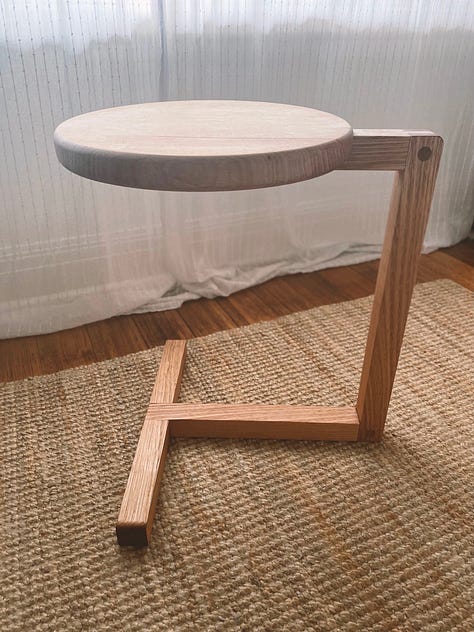
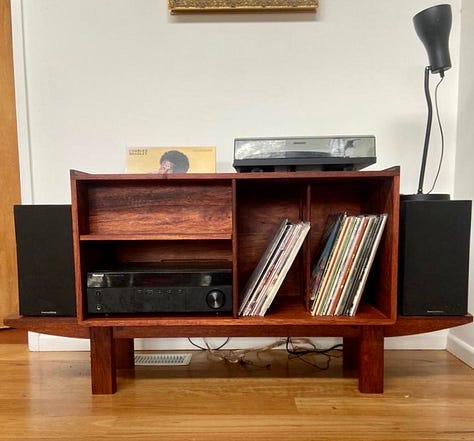
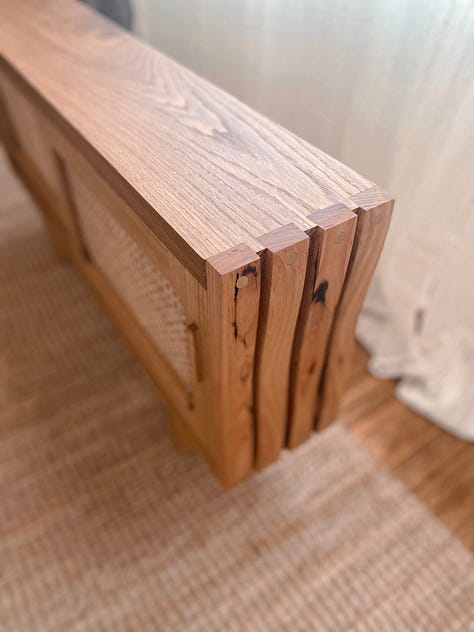
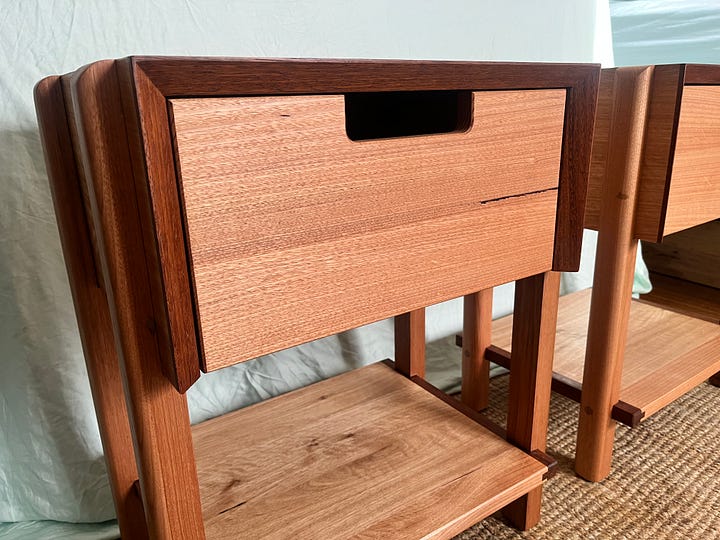
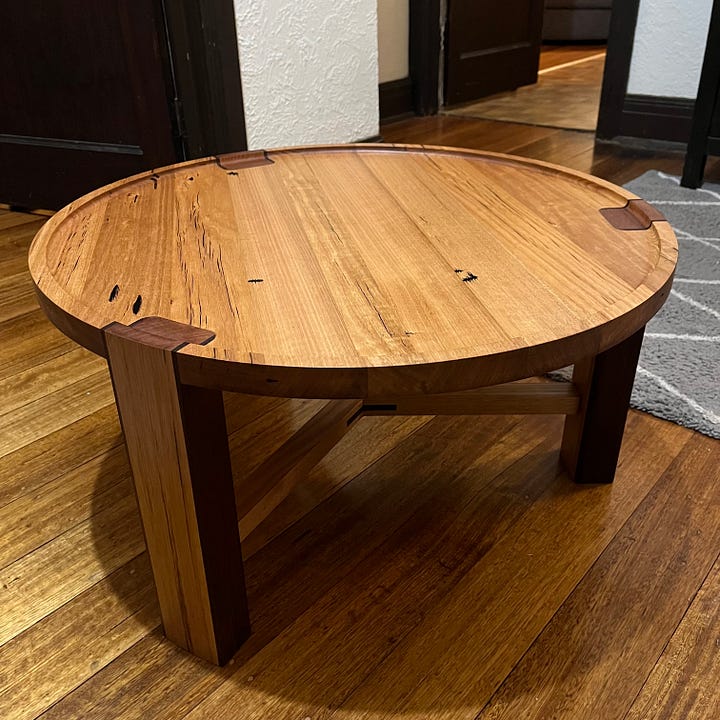
Inevitably, as my work improved, I began to receive a consistent compliment:
“Wow! That’s so good! You could totally sell that!”2
Which is a very kind thing to say to an amateur. Yet something about it bothered me (because my brain appears to be broken and can’t seem to take the compliment rather than analyse it…). People would ask, “Are you taking orders?”, “Do you think you’ll turn it into a side hustle?”, or advise that I should try and do this a couple of days a week and see where it takes me.
Something in me bristles at this, not because I have anything against people turning what they love into an income stream, but because the inevitable current of capitalism has trained us that the highest value anything can have is what it can be sold for.
Those who know me well enough and have had to suffer through my rants, quickly add, “of course we don’t have to turn everything into a commodity…” which of course embarrasses me that they already know I don’t know how to take a compliment. But for others, when I tell them I don’t really want to sell things for the moment, there is often a flash of confusion.
I mean, if you could make money from it, why wouldn’t you?
Yet the joy for me was in how much it differed from my working life. Monitoring budgets, calendar appointments, meeting deadlines, responding to crises… I love my job, but this felt nothing like that. When friends and family needed me, I could just shut up the shed without a second thought. If a table took months to make, then that's what it took. If I made a mistake, I'd swear a bit lot and work out how to fix it — it would never cross my mind to work into the night or worry about what this meant for my bottom line.
Again, obviously I'm not against selling things, but I know that commodification of my hobby has the potential change all of this for me.3 It would transform my practice in ways that would risk poisoning both sides of the equation. On the one hand, it would add pressures that would threaten the unhurried joy of my process, and on the other, it would rob the world of one more opportunity to participate in the ancient practice of giving and receiving gifts.


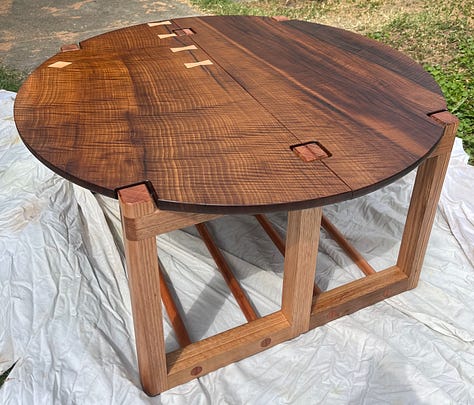

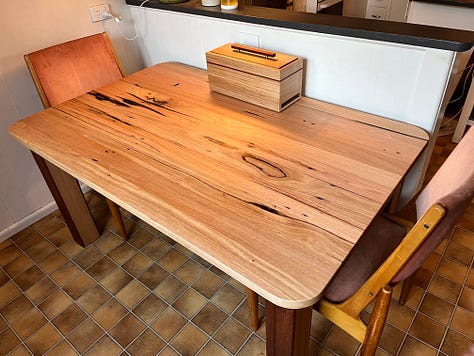
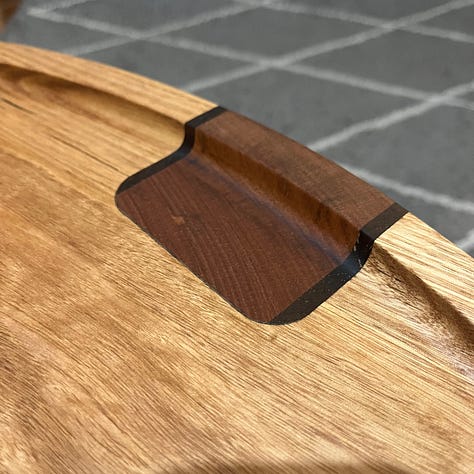
Gift giving, favour doing, unhurried presence… these are all social glue — the stuff that builds trust, meets needs and knits us together. So why do we hurry to monetise them or replace them in the market, believing that we lose nothing in the process?
Because capitalism is a vacuum that longs to be filled with commodities.
A black hole of fear, offering the promise that every hustle, every endeavour, every sacrifice made could be the very thing that would set you up for life and free you from fretting about your own security. Rather than contributing to the uncertain collective pool of reciprocal care, we’re told it’s a safer bet to fend for ourselves.
argues that this turns us into human entrepreneurs, constantly seeking to market ourselves and monetise our efforts in order to get ahead. Knowing that just quietly turning up and earning a wage is unlikely to ensure our security.I’ve learned, it’s the possibility that kills you. The tantalising promise that you could have more.
Just a little more work, a bit of hustle, a dash of ambition, a few more late nights — you could have so much more than you have now. You’d be mad to turn down a promotion, to not take on extra shifts, to be a stay at home parent a little longer! Why wouldn’t you want more?
You could even get to the point of having that mythical passive income. If all goes well, and you play your cards right, you could move from human entrepreneur to human rentier, where you own enough property to have other people’s hustle paying for your appreciating assets.4
It feels absurd to claim that craft is resistance; caserolles are resistance; soup and pie dinners are resistance.5 But I really think they are. Not just the practices themselves and the formation of networks of care, but the reminder to ourselves that not everything should be for sale.
Our future is interdependence, not hyperindividualism. If our investment isn’t in each other, we’re placing a hell of a lot of faith in a system that has no issue throwing us under the bus if it’s profitable.
Feel free to comment with the best gift you’ve received (small or large) when you really needed it.
Take care, keep crafting,
Shane.
If you already have too many subscriptions, but want to support my writing as a one off, a lovely way to do that is:
If you want to follow along, or support Untethered ongoing, Subscribe or Upgrade here:
I love hearing your thoughts and reflections, feel free to:
If you want to get in touch, send me a message:
If you want to share this post, there’s a very helpful button called:
If you enjoyed this and want to see where we’ve been, start here:
Also, an embarrassing one. I have a lot of safety protocols to ensure I’m safe when doing the dangerous bits, such as making cuts. For technical reasons, I couldn’t have a guard on the blade at the time, and after my umpteenth repetitive cut, I somehow just got distracted and dragged my fingers over the blade. Not my finest moment!
My wife once admired an indoor bench I made and remarked “That’s beautiful! Someone would pay at least $200 for that!” I mean, people pay 2-3 thousand dollars for similar work, but thanks babe 😆🫠.
Even now, I’m not ruling out selling things in the future if I think I’d enjoy it, but for this season of life, it’s not what I’ve needed most.
Economist Kean Birch believes that rather than acting as human entrepreneurs, more of us are recognising that becoming “rentiers”, those who live off the labour of others through owning rentable assets. At this point, we hold enough enough to increase our worth through utilising the labour of others. Own 20 rental properties? Perfect, then everyone else can pay your mortgages, and historically, you’re almost certain to come out ahead.
In no way am I pitting them against protest, activism and political organisation. In fact, I’d argue that all of these rely on the kinds of gift-giving networks and collectives I’m talking about here.
Also, on Soup and Pie dinners,
continues to be one of the authors who gives me hope that maybe this whole community thing really will save us. If you haven’t read his work, it’ll do your soul good.
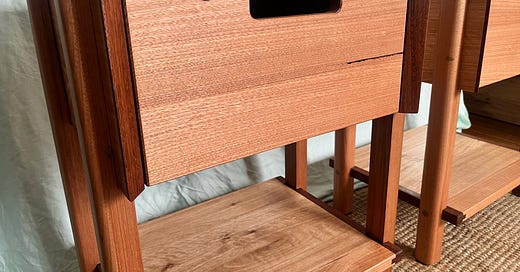







Lovely work - you could totally give that away :)
Gosh - your statement about placing equal value on labour whether paid or unpaid - that hit me right between the eyes. Seems such a challenge to do this when everywhere you turn, it is paid labour that gets the nod of approval. I really needed to read this today, thankyou Shane. Please keep sharing your thoughts with us! We need this counter-culture conversation.